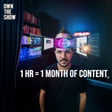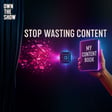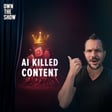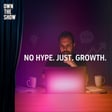Become a Creator today!Start creating today - Share your story with the world!
Start for free
00:00:00
00:00:01

AI Can Find Your Buyers. Only You Can Earn Their Trust
Get the B2B Buyer Experience Report: https://6sense.com/science-of-b2b/buyer-experience-report-2025/
In this AI marketing podcast episode, Dan Sanchez sits down with Kerry Cunningham, Head of Research & Thought Leadership at 6sense, to dissect the current B2B buying landscape and how AI is completely reshaping it. They dive deep into new findings from the Buyer Experience Study and what they mean for both B2B and B2C marketers. Whether you're selling to businesses or consumers, this episode unpacks the buyer journey in ways that will change how you think about pipeline, brand building, and long-term marketing strategy.
My Favorite AI Tools
- Tella - https://danchez.com/tella
- High Level - https://danchez.com/highlevel
- Zencastr - https://danchez.com/podtools
- n8n - https://danchez.com/n8n
Resources Mentioned
- 6sense - https://6sense.com
- B2B Buyer Experience Report from 6sense: https://6sense.com/science-of-b2b/buyer-experience-report-2025/
Timestamps
- 00:00 - Why B2C marketers should care about B2B buyer research
- 03:05 - Introducing the Buyer Experience Study and how it originated
- 06:45 - Breakdown of B2B buying stages and shocking distribution stats
- 10:32 - The myth of buyer exploration: decisions are made way earlier
- 15:18 - Why your sales team is too late if you're not on the shortlist
- 20:00 - Understanding buyer behavior and the 77% top vendor stat
- 24:50 - Why preferred vendor changes don’t usually change the deal
- 30:40 - The deadly mistake of ignoring early-stage buyers
- 35:15 - Using AI to detect in-market accounts and content needs
- 42:00 - How to build content for every role in the buying group
- 46:05 - The HubSpot and Marketo inbound strategy case study
- 50:40 - Reframing how we define leads and contacts
- 56:10 - What the next-gen CMO is doing right now to win later
- 01:00:45 - Relationships still matter, but AI can amplify them
Transcript
How is AI transforming marketing?
00:00:00
Speaker
AI is changing the landscape when it comes to B2B marketing. But even if you're in B2C marketing, you might want to pay attention to this episode because it has ramifications for everybody in the marketing landscape.
Interview with Kerry Cunningham on AI and B2B buying cycles
00:00:12
Speaker
In this interview, i actually got brought out to the Breakthrough Conference by Sixth Sense to interview a few key people, and this one I got to interview their head of research and thought leadership, Kerry Cunningham, to talk about the research he's done about the B2B buying cycle, how AI is impacting it, and what we can do to actually get way ahead of the competition when it comes to buyers entering the pipeline.
00:00:36
Speaker
So if you're in B2C, I promise this interview is packed with all kinds of information. One, you might be in B2B someday, but even if not, there's always lessons we can take from one industry to apply to another.
00:00:48
Speaker
So I highly recommend checking out this episode. I thought it was fascinating.
Insights from AI research for future success
00:00:52
Speaker
Kerry and his research has answered so many questions that I've had about how companies and the people in them actually research and evaluate large services or products, but even how a B2B buyer thinks about things as they go throughout their journey. A lot of the evidence from this report is shocking and he dropped some of the best nuggets as far as what companies could be doing now to set themselves up for success five years from now that's unintuitive and a lot of people don't even know exists, but AI is making possible.
00:01:24
Speaker
So if you wanna get ahead on the future of marketing, listen to this full interview, especially the last five minutes. know
00:01:37
Speaker
Kerry, you just did a lot of research and you just announced it from stage, all these different things. And I was excited because this is research that I swear I was looking for just a few years ago. And I was like, where is it?
00:01:47
Speaker
I know everybody keeps claiming that only 5% of the market is ready to buy at a time in a B2B setting, but I could never find the research. yeah Now I find that i'm like, oh, there it is. Finally, someone actually did the digging, actually did it proper research. And even the way you talked about it, I'm like, Kerry knows how to talk about this. Kerry's, this is your thing. yeah um And you've been doing this a couple of years, right? With Sixth Sense.
00:02:10
Speaker
So I'd love to learn more. Give me like an overview of the research that you did. And then I'd love to dive into the buying cycle stages specifically. Yep.
Changes in B2B buying process
00:02:18
Speaker
ah So we've been doing, this is the third year for this specific study. We call it the buyer experience study.
00:02:25
Speaker
looking at how buyers buy in B2B. It's actually a it's it's my version of correcting what my old company Serious Decisions did. So they they still do a study, but I didn't think it got quite at things that we needed to do. So I was an analyst for about eight years before starting the research stuff at Sixth Sense.
00:02:45
Speaker
So this being the third year, we we found out something really interesting the first year around, we could talk about what that was. The second year in research, you really have to replicate something to,
00:02:57
Speaker
know that it's true. We replicated a second year. Replicated again a third year, but one one of the things I talked about was that something really big changed in the way things happened this year.
00:03:08
Speaker
And it was a lot of fun figuring out what changed. It was kind of harrowing finding out that something changed and then figuring it out was fun. um And the main thing that we really want to understand is just what does that buying process look like? When did decisions get made?
00:03:24
Speaker
How much role do sales people play in the process? How much is marketing? How much is neither one of those things buyer experience? So that's kind of what we're getting into.
00:03:34
Speaker
It's the big stuff. It's the big questions that everybody wants to know. One of the standout things was actually breaking down the research of the buying
Understanding buyer stages
00:03:42
Speaker
cycle stages. Yeah. and the things you talked about was that you had it broken down into kind of your target awareness consideration decision and purchase your typical funnel and you had it broken down into 60 of buyers being in the target stage 17 in awareness 17 percent and consideration four percent decision and two percent in purchase yep to get some clarity on this you said from the stage that this was
00:04:10
Speaker
It's kind of a snapshot of where your buyers are any given time, but is there a time period we're talking about here? Because technically, like a purchase is like a one-time event. It's not ah it's not a stage to be in. It's like ah it's a it's a threshold you cross over. yeah So are you defining this by quarter or by month? How are you defining it? if if you were to If you were to just say, take any thousand accounts, if you looked at, so if we back up a little bit, like the the reason we know these stages is that what Sixth Sense is doing for all of our customers is we're looking at all of the buying signals.
00:04:41
Speaker
We build a predictive model that says, all right, well, based on what we know about how your buyers buy historically, here's where we think each account that that you're you care about where they are in their buying journey.
00:04:54
Speaker
right And those buying stages actually based on ah literal percentage. It's a prediction. How likely is that thing to become, that account to become an opportunity for you?
00:05:05
Speaker
um And so we're predicting these stages for millions of accounts. We looked at 19 million accounts across a thousand or so customers. So if you just go in across a bunch of Sixth Sense customers and take a snapshot and say, okay, here's here's a million accounts that we're monitoring on behalf of customers.
00:05:23
Speaker
how do they How are they distributed across those stages right now? yeah And then you go in tomorrow and you do another one and you look at another one, you just keep taking snapshots. The average of those snapshots is what you saw on that screen.
00:05:35
Speaker
Does that make sense? that That's what that is. So at any given time, like if your business is cyclical, let's say that you're in education and you sell stuff to high higher ed. you You can probably tell me that, you know, all of your deals are in purchase from September to November or whatever that cycle is. But for most businesses, it's not like that. And so that's what tells us that out of any given 1000 accounts, you have 600 of them, they ain't market now. And the rest you've got to figure out how to deal with.
00:06:08
Speaker
Now this is an insightful data to me because I can look at this and make a number of, have a number of insights. One, there's only so many at the very bottom, actually into the decision stage and the purchase stage. But by the time they're in the purchase stage, like if you're not in the conversation, you're definitely not gonna get there. So it's really like, there's but if you look at as a whole, you just take consideration, decision, purchase, well, that's 25%. That's a lot.
00:06:32
Speaker
That's a lot. But that's when you come in with the killer stat, which was like, yeah, but...
Importance of early engagement in B2B marketing
00:06:39
Speaker
by the time they're reaching your sales team they already have a short list of five vendors or five solutions to pick from yeah and if you're not in those five if you're not in that short list uh what would you say it was like a 23 chance that they're gonna pick you if you're not in the short list it's kind of worse than that so um they put that short list together on day one of their buying journey
00:07:03
Speaker
So that average buying journey is 10 months long. So before they get to awareness, like on the day they arrive. Oh gosh, that's even farther back. Yeah, it's farther back. So if you're going to get revenue from them, you know, so if they're going to buy something in October,
00:07:19
Speaker
On January 1st, they put four of the five vendors are going to evaluate on the shortlist. They add the other one sometime soon after that. All of that, but we've what we've said for years, like buyers go into market and they look around and all of that.
00:07:32
Speaker
All of that's about just figuring out who's going to be the fifth vendor who has almost zero chance of winning the deal. So those first four... have it, the buyer, the the purchase is gonna come from those first four they put on the list 95% of the time.
00:07:50
Speaker
So if you're not on that list, that four out of the five, you're done. There's still, I'll say we can talk about this later, but there's still a really, really good reason to get on that list then. So you've gotta work your ass off to be the fifth vendor, even if you know you're not gonna win.
00:08:04
Speaker
yeah Because that's the only way you get to one of the, no, it's the only, yeah, there really isn't a chance, but, But if you want to be one of the four next time, that's how you get to be one of the four next time.
00:08:16
Speaker
And so there's so there are a bunch of stats we didn't talk about because i just didn't have time. ah hub But yeah, so that's what it is. And then the 23 percent thing that you said. So so they go into market day one. They put four of the five vendors on the list.
00:08:31
Speaker
Now, on average, six months later, that buying group has finally decided what order those five vendors go in. And the one on the top of that list at that point is the one who's going to win the deal 77% of the time. Just the one of the top five. The one on the top five. I was just about to follow up. I'm like, the 80-20 principle tells me that the top one or two are probably taking the lion's share of even the...
00:08:56
Speaker
Well, fine probably, yeah. So probably, you know, of the 23% that remains where where the deal changes after that, it's probably number two. So, you you know, it's conceivable a lot of buying groups ah arrive at consensus on the order of the shortlist, but one and two are very close.
00:09:12
Speaker
yeah And those are probably the ones that flip, but only 23% flip. Now there's a fascinating number. I didn't get a chance to talk about it here, but it's in the it's in the reports.
Impact of sales interactions on buyer decisions
00:09:24
Speaker
We asked buyers specifically, did your preferred vendor change after you started talking to sellers? That's a different question than did your decision change. We asked if your decision changed also.
00:09:37
Speaker
Preferred vendor changed 42% of the time. Decision changed 23% of the time. So even when buyers get to the sales process and they realize, oh crap, I like this other vendor better, half the time they still don't change their decision.
00:09:55
Speaker
It took six months to get the group to agree on this one, And I'm not gonna go back and relitigate that just, you know and and maybe again, I prefer this other one, but the difference isn't that big.
00:10:07
Speaker
I'm not gonna change my decision. So to me, that's fascinating. It also speaks to the fact that your sales reps are having a big influence on those buyers. But only about half of that influence has any impact on changing the deal.
00:10:20
Speaker
This one. And that's why I say it's super important to get your assa on that list and be even be the fifth vendor with zero chance of winning the deal because you may flip their preference ah during that that validation phase.
00:10:35
Speaker
You're going to win the deal as a result, but it'll get you to the list next time. So to me, that's It's fascinating, it's a window on how the world actually works.
00:10:48
Speaker
No sales rep in the world wants to hear that. I think a lot of marketing knew that. I think sales was probably hard to convince of that. yeah But I think as marketers, I've probably felt that before. I've even been the the champion on many software ah upgrades or just ah overhauls or whatever within my own companies before. And because I'm the one championing the change,
00:11:10
Speaker
I almost always had a preferred vendor. But naturally, you can't do that. You always have to show your due diligence. yeah But let's be honest, I was come so biased that there was just no way. yeah i was good I'd already done it in my head.
00:11:23
Speaker
And then i was doing the Excel sheet and even went and met with stakeholders to get their things, I'd always almost reverse engineer what they needed into the new thing. Yeah. so Every time. So I think, if you know, that's that's a self-realization that I think if more marketers would just sit down and think that through, they would find that, of course, that's what I do.
00:11:43
Speaker
And if I'm doing it, of course, that's what our buyers are doing. um You know, in psychology, the term for that is motivated reasoning. i like i I like this vendor. That's the one I want.
00:11:55
Speaker
and I'm going to see everything that they do. Like it's a version of confirmation bias. Everything that they do and say, I'm going to interpret that in the way that is most favorable to that brand I like and less favorable to the other ones.
00:12:10
Speaker
Every buying process is is ah is that. It puts a lot of emphasis on marketing before they even ah enter the awareness stage, the awareness that they need help with whatever solution is that you
Targeting early-stage buyers
00:12:23
Speaker
provide. right um And so my next question is like, now that we know that, now that it's like we've all had a feeling about that, but now that you've kind of proved it empirically with fantastic data from Sixth Sense,
00:12:36
Speaker
What do we do about it? Yeah. Well, I think, you know, so my recommendation to to the audience today and in the reports is we know that there's roughly a third of your ICP at any given time is early in a buying journey where they're persuadable.
00:12:52
Speaker
ah And that's where we need to focus our resources, our best resources and attention on that set. So right today, most B2B organizations are spreading their marketing budgets across 100% of their ICP or even more than that. You know, they're even outside that.
00:13:12
Speaker
So you know We think we're doing a good job by just focusing our demand gen on all of our ICP and only the ICP, but 60% of your ICP could care less about your demand gen right now, even if you're a perfect fit because they're not in market. yeah you know If you think in software in particular,
00:13:30
Speaker
ah you know fifty you know everybody's on two-year contracts, 50% of your audience is in year one of a two-year contract. so They're not interested, right? that's this is not what This is not a time. They're not looking at anybody. And if you try to attract them with your with your demand gen activities, not paying attention to that.
00:13:50
Speaker
Now what they do is, you know, it's their job to to keep track of vendors and what they're doing and know if there's something better happening. And so they are going to be looking at those things occasionally, but they're not going to respond to your demand gen. They're not going to become leads.
00:14:04
Speaker
If they like this thing that you published or whatever, and they go to your website and fill out a form, they're never going to respond to your BDRs or SDRs. It's not why they looked at the thing. They're not in market. And so the important most important thing we can do is focus on the 30% or 30 whatever right around there that are in market now.
00:14:23
Speaker
And even, you know, we saw that it's just about 6% that are down at that really sharp end of the buying process. So, you know, we have to realize 30% are in market, but somewhere between being in market early on and actually making a decision to purchase,
00:14:39
Speaker
most of them drop out there. and Most of don't make it that far. So we spend all our time competing for the 2%, that tiny little slice of the pie.
00:14:50
Speaker
What we really need to do is shift our attention back to the 30%, figure out why in our market, for our solutions, whatever they are, why do buying processes fail? Why do they stop? Why do they say, oh, you know what? We're not going to go through with this.
00:15:04
Speaker
um LinkedIn has some great research on it. They they did some research on buyers and asked them you know if your buying process didn't end up buying something if it just stopped. Why? 40% of the reason is that the buying group could not come to consensus. They couldn't agree.
00:15:23
Speaker
Right? That's tragic. So so this is this is an organization that says, yeah, we want to go out and buy something. But yeah I talked in in um my presentation about the fact that your buying group is filled with people who have a lot of experience in whatever it is that they're looking at right now.
00:15:37
Speaker
They know the vendors. They know sales reps in those vendors. So if you've got four of the five vendors on the shortlist on day one, it's because people in the buying group know four of those five vendors.
00:15:49
Speaker
And you probably have within the 10 people in the buying group, four opinions on day one about what they should do. That whole next six months is about ironing out those disagreements about which is best.
00:16:01
Speaker
And it it fails as often as it succeeds. and And so they end up just sticking with what they have or doing nothing. yeah That's tragic, right? You get it you get a group of people who've agreed, they put budget aside and all of that stuff, and then they end up not doing it because they can't agree what to do. i mean That's interesting. So there's a lot to do, even if you're coming in rank stack number one, it's not a guaranteed win. no Half the time it's failing.
00:16:24
Speaker
So sales really has to work on keeping the ones, even even if you have a favorable disposition. But it's really marketing is going to have to do that because marketing is the one who's still really communicating with that vendor and enabling that buyer. yeah So I think, you know, one of the one of the things that we have to do much better is focus our attention on that small set of accounts that are in market and persuadable and enable them such that the people who are on your side in that buying group have all the ammunition they need to convince the people who aren't.
00:16:55
Speaker
Right. And we don't know which ones those are in any given buying group, but that means You know, if if if we know from our our research that the ones who like us best are the primary decision makers, but maybe the IT guys or the finance people are the ones where we have some trouble, we have to develop messaging. We have to do things that are gonna help those people get over the hump.
00:17:15
Speaker
Whatever that is for your business, you gotta to know that and you've gotta do that. So enlarging the slice of the pie of of companies that actually get down to make a decision to buy something is the first best thing we can do.
00:17:26
Speaker
And I haven't answered your question about what you know what to do about getting on that shortlist. So one, you've got to do a much better job there because in B2B, unfortunately, nobody's going to say, you know what, let's just spend a bunch more on brand and reputation marketing. mean, you know, that would be great, but that's not what people are going to do.
00:17:43
Speaker
So we have to get more efficient at getting the persuadable accounts to buy from us. Yeah. And then use some of that savings to go back and do a lot of brand new reputation, a lot better brand and reputation marketing, You said about one third are in the early stages. And is this one third of what you just defined as the target ah target accounts at 60%? So it's roughly 20%? It's that 17 plus 17 awareness and consideration stage. Okay, so this is the ones that are early on ye um that are persuadable. yeahp So, I mean, that's...
00:18:16
Speaker
You're right.
Focusing on persuadable buyers
00:18:17
Speaker
that's what It's a little over a third, but it's about third. Yeah, just about a third. And you know, so these numbers are all going to be plus or minus a certain amount at any given time. So that's the set that they're persuadable, they're in market.
00:18:29
Speaker
By the time they get to the decision stage and they're down to 4%, those folks have largely made up their minds. yeah yeah You know, marketing's done. So now that we have clarity on where we need to pay attention, where... where we still need to fight even if we're the top ranked one. How does AI change all the different things that we need to do as marketers yeah now that we have access to it? So ah the thing I said today is I feel very strongly. And then so the best highest use of AI right now is to make sense of all of the buying
Role of AI in market readiness
00:19:00
Speaker
signals.
00:19:00
Speaker
So there's, we process a trillion signals a day. So making sense of that means making predictions about which accounts are in market.
00:19:11
Speaker
That's the single most important thing that we should be using AI for. And it's by far the most mature use of AI. 6Sense has been doing it for 12 years.
00:19:22
Speaker
so So that's the the single most important thing. And i think every B2B organization should focus on that first. Then, like one of the things I talked about today, the very first thing I talked about is we're doing a really bad job of supporting the actual decision makers that we want to sell to because we don't understand who they are.
00:19:45
Speaker
The people that we sell to, we even if we sell, you sell yeah ERP solutions, you sell CRM, you sell things that have been around forever. the people who are buying those things they notice those things backwards and forwards they know everything about them they've been to all of the conferences going back decades
Creating meaningful content for advanced buyers
00:20:05
Speaker
and none of the content that we have on our websites or that we send them in our nurture streams or anything is telling them anything they didn't know already 10 years ago it's just not helpful for them yeah it's fluff and spin
00:20:19
Speaker
ah And even if you're a relatively new category, um it's very unlikely that you are going to be ah reaching an audience that needs your most basic explanation of what you do.
00:20:33
Speaker
That is not what they need. You know what? They need a real, s they read need to really understand how you might impact their business. And then we need that for not just the primary decision maker, like the person who runs that department who would buy it, but the finance person, the IT person, the whoever those people are who are also involved in that decision. We need real content that's going to speak to them about why they should take a chance on you.
00:20:57
Speaker
And that's going to help them agree to to go through and buy this thing. And so there's another great use of ai Gen AI this time. to get that content built. Our excuse for not having it has always been, it's too expensive, we can't we can't manage it.
00:21:13
Speaker
That excuse is gone. We got to do that now. So when you're marketing to the one third that isn't yet in market or is starting to approach it, they're in the early stages.
00:21:24
Speaker
To me, this is like based on that, this would be the program that I might test out to put in place to try to solve that. ah generally you're probably going to lead that initiative with top of the funnel type content, things that address their their problems, their pains, maybe not with your solution yet, but your you're starting to talk to them about maybe your philosophy, your approach to their problems without even mentioning the solution.
00:21:47
Speaker
It's through podcasts, could be through webinars, could be through your LinkedIn posts, whatever it might be. You're creating content around it that's helpful to them, that starts to help them ah break truly identify the problem that they're feeling already so that they become aware and then your solution of course stands out. But you're you're educating them, you're truly trying to show up and be helpful.
00:22:08
Speaker
A number of different ways to do that, a number of different channels to do that in. But the strategic part becomes like, okay, well that's general and it's available to the whole ICP because you're publishing it, you're not gating it, you're putting it out there. yeah But what becomes strategic is if you can know like which accounts are actually in early market, you could be boosting it.
00:22:29
Speaker
Your sales team could be out like spending time reaching out to them, inviting them one-to-one to come to the webinar. You could be invited to be a guest on your podcast to build relationships with them because you only have so much time and scope for that on your podcast, right? yeah You could be spending a little bit more ads promoting that early level thought leadership just to those accounts instead of spraying everybody and hoping for the best. yeah And of course, different accounts are rotating in. So over time, you're actually probably getting everybody as everybody rotates in eventually. yeah
00:23:00
Speaker
But you're spending the time, the effort, and the more ah variable cost in a more strategic way. am i Am I kind of getting that right? Sure, yeah. So, I mean, um the that use of AI I just talked about, understanding where your buyers are in the journey, the first most important thing is is knowing that um here's a bunch that just went into market and now we can.
00:23:22
Speaker
I don't even like the term personalized, because frankly, ah nobody needs their name on a piece of content coming at
Aligning content with buyer decision-making
00:23:28
Speaker
them or whatever. What they need is for it to be in context. And that's exactly what you're talking about. The context is,
00:23:34
Speaker
all right, this is what we're thinking about, we're weighing our options. Maybe there's a couple of different ways we could solve this business problem. One involves buying technology, one involves something else. So the kind providing stuff that's right for the context, but I think the, and and one, second use of the signals then is all these signals that tell us they're in market, um are there signals there that can tell us how they're thinking or what they're thinking so that we can deliver the right piece of content or make sure that they know about it, right? I mean, and I think that that's,
00:24:03
Speaker
that That's a really great additional use of the same signals, right? Is to to identify what to do. And then I think, you know, everything that we can do to make our content and and the experiences we have available, make them just maximally available. Because the truth is the world is super messy.
00:24:21
Speaker
Our buyers are, you know, you may have One member of a buying group who has been studying something for months, knows exactly what he or she wants to do, or just got hired into this company after buying this thing at the last company they were at. That happens all the time.
00:24:36
Speaker
right Everybody else in that buying group is months behind. This person's way ahead. so That person needs the very best, most advanced specific content you have about why they should do it for this company now while everybody else may need stuff at a different level.
00:24:53
Speaker
yeah um And so it's just gotta all be available for everybody all the time. and you know And then use the signals to sense how to get it there. So we've talked about how AI can help along the process.
00:25:05
Speaker
I'd love to know, is there any is anything in the research indicate, or maybe even from personal your personal experience in talking to people, what leads a company to being ranked stacked one?
00:25:17
Speaker
yeah What are the behaviors they're doing? What are the types of content they're putting out ah that that leads to that? I would love to say that there's a good answer there. And we've asked the question in in many surveys and the answer is always as boring as it could possibly be, which is and buyers, yeah, I mean, it depends. and And buyers say that they kind of like everything and they kind of think everything's okay.
00:25:39
Speaker
ah you know They're not blown away. And i think the reason for that is the channel is much less important than the content. the The delivery device is much less important than what's in the content and what it says and whether it says to me. And we spend way too much of, I think, of our time and energy thinking about the channels and those kinds, and not so much about what are we actually saying?
00:26:05
Speaker
Because that's... It's actually a much harder problem to solve, right? ah But it's why people don't care about our content. I said this today, that we're we're not losing people's attention to ChatGPT.
00:26:17
Speaker
You know, that is a cheap out, if you ask me. We're losing their attention because you're not saying anything interesting or useful. That's why they're not coming to your website. You know, if you are saying or providing an experience, ChatGPT is never going to pride a virtual experience of what it's like to be a customer of your company.
00:26:35
Speaker
But you aren't either. You know, as soon as you do, people will come to your website
Importance of quality content over channels
00:26:40
Speaker
again. But. yeah So I think it's it's way too cheap and easy of an excuse to say, oh, chat GPT stole my web traffic.
00:26:47
Speaker
yeah You don't have any reason to to come to your website, and that's why. One of the case studies I go back to over and over again of people who did pretty good building demand on the front end through just being helpful was HubSpot, right? Back when they launched inbound.
00:27:04
Speaker
Inbound was interesting because it was an approach. ah Obviously HubSpot became the premier solution to doing inbound, right? But you could do inbound with just about any system. Of course, they they made it so their system would do it better than everyone and they would make that case, but they were giving certifications away. they're helping you they They helped people transition from the traditional approach to digital. They were the best best advocates for it. They were. They were the kings of content marketing and getting, you know, they provided things that were really useful and interesting. The other one that did that is a very similar kind of company, Marketo.
00:27:37
Speaker
So early days, all of those, you know, ultimate guides to or whatever they call them were super useful. But here's the problem that we ran into ah with all of that and the whole problem with inbound marketing to begin with.
00:27:53
Speaker
you know Back in the day, in the early days of that, when buyers came to your website and found your content, if they had to work hard to get there and your stuff wasn't that great, they were there because they really wanted to be and they had a reason to be.
00:28:10
Speaker
But the better and better your content gets, the less likely it is that they're in market and the more likely it is they're just there because you have great content. Now that's not bad because you're building brand equity and those that matters over time a lot. You should absolutely do that.
00:28:27
Speaker
But it is absolutely going to crush your lead quality. Your lead quality will be terrible. right' That's not why people are there. People are there because they're learning. right and it's a it's an amazing place to be to be the source of learning for your audience but you cannot continue to look at those people as leads the way you did when the only reason they got to your website is because they worked really hard to get there and there wasn't anything other than can you call me because i want a sales rep to talk to me right yeah so and And we're in the danger of doing that all the time where we see, oh, here's a channel. The channel's really great. Let's do more of that.
Building broad audience engagement
00:29:04
Speaker
And then you pump up all of the things that got people interested in that channel. But now the people who are responding to that are no longer really buyers. They're people who just like what you're doing.
00:29:15
Speaker
You know, we put on great webinars. Okay, great. Now people are coming to your webinars because they're entertaining. not because they're in market. And that's something we always have to be careful that we're not, you know.
00:29:28
Speaker
And again, i think you should be doing it. Like this is, it is the way to build an audience and to build a market and to- to build a bridge between essentially your- I find that good good people who do content marketing well are essentially becoming mini media companies yeah in and of themselves. I mean, like i mean HubSpot's really, again, led led the charge in this. i't i don't know about their new positioning that they've led away from inbound. I forgot what they called it, but they just launched something new and I can't remember what it it is.
00:29:52
Speaker
ah But obviously, they they went and bought the hustle and they're building a little podcast network or a big podcast network. um but they're trying to own the media. yeah And then they inject little signals back.
00:30:05
Speaker
And I find that would probably be pretty helpful to have a newsletter. It becomes first party data. You could build intense signals into it based on a certain click that indicates that, oh, they're starting to feel this pain if they clicked on this link, right?
00:30:15
Speaker
So that might be somewhat in favor. It can be, but you have to you have to recognize that the signal that existed when it was this little thing in the beginning, yeah it's not the same signal anymore.
00:30:28
Speaker
And so along the way, it could mean lots of different things and there are different ways that you need to interpret it. But that's what we didn't do in B2B. We built great mechanisms. It's like, you know,
00:30:40
Speaker
uh i won't have a great analogy now but it's it's it's like where we found out that the kids like chocolate and we're just giving them more chocolate and you know that all right they love chocolate but you know that doesn't get us anywhere else except maybe rotten teeth um So it's interesting. We gotta do those things, but be very careful to build bridges back to where we can actually consider them a lead. and Because a contact isn't a lead. A lead is somebody who's showing intent, purchase intent.
00:31:11
Speaker
um But a contact is, well, it's just a contact. Well, and you've got it. So one again, if you know, if if you're looking at the accounts and you're scoring the accounts based on intent and you use six cents to know which ones are in market.
00:31:26
Speaker
Now you can look at all of the millions of people filling out your forms or listening to your podcast and say, these are the ones who are actually in market. Yeah. what you'll find the better you get at it is the percentage that are in market will go down because you've got all of these people who are not in market now consuming your content i mean again that's a really really good thing you want that but it's going to make your lead quality look bad your lead quality should stop being a thing that you think about what you should be thinking about is you're building a great audience
00:31:59
Speaker
And you have to know, like if you if you go from a hundred people coming to your website to a million people, are there a million people who are part of active buying groups anymore? i don't think so. You know, like it can't be that. That's not the answer. The answer is some small fraction of those who are in market. Now the ones who aren't in market now, that's how we get on the short list is everybody's going to put us on the short list because they've been coming, getting value from us for two years. yeah Right. And now they're ready.
00:32:27
Speaker
Now they're in market. Now they can't wait to buy from us. That's what this event that we're at today is, right? There's a lot of people here who are going to walk away with the impression like, I want to be a customer of this and I want to be a part of this.
00:32:41
Speaker
And it may not be the right time. And that'll be frustrating for our sales reps. But this is going to cause a lot of people to say, i want to be part of this. And, you know, that's how it works over time.
00:32:54
Speaker
So would you say that people who opt in to hearing from you, to learn more from you, is probably one of the best early indicators of you being rank stacked. Well, it's an indicator that when the time comes, you will be.
00:33:08
Speaker
You'll least make the top five, maybe the top one, depending how yeah helpful your resources were. It's a good indicator of you'll get on the short list. yeah And then once you're on the short list, you have to become that, you mean, you actually have to show up and... and and Your product has to be good. Yeah, there are going to be other people in that organization who probably didn't watch your podcast or didn't read your content, and they're going to have to say yes, too.
00:33:30
Speaker
yeah And are you do you have the the ability to get them on board as well? ah Yes, and that's where the AI really starts to come into play. yeah i mean, you could do that manually, too, and just once once you...
00:33:43
Speaker
once they come and you're on the short list, you'd be like, okay, well, let's go look up the people that we know are in the buying group on LinkedIn and start seeing, if we can manually reach out to them and stuff. But if you can automate the process, only then all of a sudden you can scale it. yeah And AI can customize your value proposition for each of the different types of buyers within that organization. That's exactly right. So think about, you've got, let's say that you know your your inbound marketing blows up.
00:34:06
Speaker
and you've got people coming to your website, people reading your blog, people coming to your podcast, all of that stuff is happening a lot. Now the next thing you need to do is start producing content for that buyer persona who's doing that, that says, here's how to talk to your CFO about,
00:34:23
Speaker
why you should buy us. Here's how to talk to the CSIO about why you should buy us, right? That content that supports them in getting those other people on board, they're already sold, right? They're they're getting value from you. They love you already.
00:34:36
Speaker
But if you all you do is pour more on top of them without supporting them having this other conversation, you're gonna miss opportunities. So my last question for you is, you're thinking a lot about this stuff. You're steeped in it, you're thinking about AI, you're working at Sixth Sense, so you're seeing a picture of what the future is gonna be. yeah Sometimes I like to think about like, the people that are gonna be the headlines, the companies are gonna be crushing it, and their their CMOs are gonna be speaking on stage and stuff.
00:35:03
Speaker
What are those people doing now? aggressively yeah that's maybe not everybody's paying attention to so much.
Developing content for entire buying groups using AI
00:35:11
Speaker
What are they doing now that five years from now everyone's like, man, we should have been doing that.
00:35:16
Speaker
We could have known, but it it wasn't obvious then. Yeah. I think part of it is building that the content and experiences for the people that are part of the buying group, but not our primary target.
00:35:29
Speaker
you know those That's what I become more convinced of the more I study buying groups. yeah Those people, they care very much. you know the The head of finance cares very much about marketing automation and knows a lot about it because he's been involved in nine purchase cycles for it over his career. right We don't think about that.
00:35:48
Speaker
and It matters a lot to that guy. He takes his job seriously. Same thing with the head of IT. Same thing with ah all the other people who be involved in that purchase. um and And yet we don't do anything to support those folks. so I think the people who are seeing the opportunity to use AI to start building that content and then figure out how to make it as frictionless and easy as possible to get it in front of those people when they need to see it, think those are the ones.
00:36:13
Speaker
And then, yeah know, the other thing that we find out is relationships still matter a lot. and Like there's a, one of the things I think that that that's the heaviest weight on this industry is just the expectation that, you know, a sales rep, their job is to take a buyer who may or may not wanna buy from us and convert them into one who buys from us in the next three months.
00:36:38
Speaker
And that's just not realistic and it's not how it works. And so, you know, you're your sales reps can flip some buyers where you're not on the top of the short list when they start, but not that many.
00:36:49
Speaker
But what they can do is build relationships that last over many cycles. Yes. And that's what buyers say in their service. You know, they all say, hey, I know sales reps at those accounts.
00:37:00
Speaker
And those relationships are what gets you onto the shortlist, what helps motivate those buyers to find the reasons to buy from you instead of somebody else.
00:37:11
Speaker
So those relationships, I think, are still really important. But we have to think differently about when they have their effect and It's a longer term effect. you know We think only quarter to quarter, especially in sales, quarter to quarter to quarter. you know Did you make your number? or You suck. right Well, maybe you didn't make your number this quarter, but you built a lot of relationships. We've got to figure out how to see that, manage it, incent it.
00:37:35
Speaker
I think those organizations who figure that out, kind of oddly enough, are going to have a huge advantage. And that it might be AI help that helps us figure that out. ah But that's a i think that's something that the research is pointing to.
00:37:51
Speaker
It's like super, super important, but not in the way that we thought. I'm really excited about what you just said. I'm like, oh my gosh, this is actually gold the right here. And so I hope everybody else picks it up. I'll probably have to do a whole other episode unpacking that. That'd be awesome. It's fantastic.
00:38:08
Speaker
Cary, thank you so much for your time. Yeah, my pleasure. Thank you.




![What’s Your Authority Score? [The 5-Factor Test] image](https://media.zencastr.com/cdn-cgi/image/width=112,quality=85/image-files/630c9f06819f8b3dba5fa460/cfbaccba-f587-45de-a41f-e2c99c15e2a5.png)
![The Audience Growth Engine [Full Framework] image](https://media.zencastr.com/cdn-cgi/image/width=112,quality=85/image-files/630c9f06819f8b3dba5fa460/46b84fd1-e856-4687-9aee-6b4a7e0bc7ff.png)


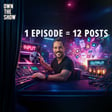
![The "Dream 100" Execution Plan [Google Sheet System] image](https://media.zencastr.com/cdn-cgi/image/width=112,quality=85/image-files/630c9f06819f8b3dba5fa460/fcd89374-76a4-4e58-a2e3-2bb7ddda4364.png)
